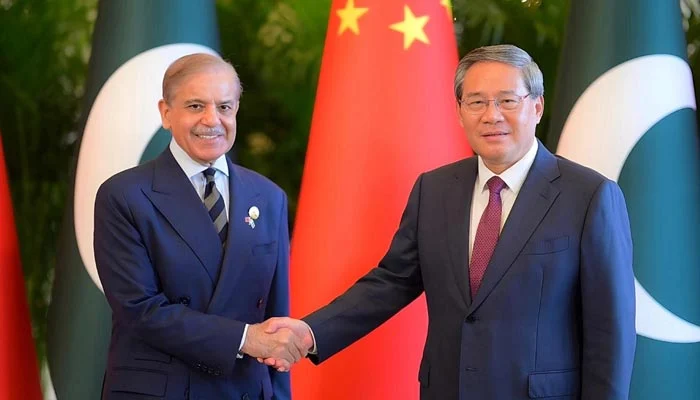Strengthening Bilateral Cooperation
Pakistan and China on Thursday reaffirmed their dedication to advancing bilateral cooperation under the upgraded China-Pakistan Economic Corridor (CPEC 2.0). The renewed commitment came during a meeting between Prime Minister Shehbaz Sharif and Chinese Premier Li Qiang. Both leaders expressed satisfaction with the progress of their relations and pledged to collaborate closely in the next phase of CPEC, which now includes five new corridors.
Prime Minister’s Visit to China
Prime Minister Shehbaz Sharif is currently on a six-day official visit to China. His trip began on August 30 when he landed in Tianjin to attend the Shanghai Cooperation Organisation (SCO) summit. The visit has been marked by high-level meetings, exchange of agreements, and renewed vows of strengthening cooperation. During the latest meeting, the two leaders also oversaw the signing of multiple memorandums of understanding (MoUs) covering areas such as science and technology, information technology, media, and agriculture.
Warm Reception and Diplomatic Exchanges
The meeting was described as “warm and friendly,” underscoring the strong bond between the two nations. Following the delegation-level talks, Premier Li Qiang hosted a grand luncheon in honor of the prime minister and his delegation. PM Shehbaz expressed his deep gratitude to the Chinese leadership and people for their unwavering support of Pakistan’s sovereignty, territorial integrity, and socio-economic growth.
Building on Strategic Consensus
The discussions built upon the consensus reached between President Xi Jinping and PM Shehbaz during their earlier meeting on September 2. Both sides reiterated their commitment to strengthening the “iron-clad, all-weather strategic cooperative partnership” between Pakistan and China. PM Shehbaz also extended congratulations to China for successfully hosting the SCO Council of Heads of State Summit in Tianjin and for commemorating the 80th anniversary of the Chinese people’s victory in the War of Resistance and the broader Anti-Fascist War.
Pakistan’s Admiration for China’s Transformation
In his remarks, PM Shehbaz paid tribute to China’s remarkable development journey under the visionary leadership of President Xi Jinping. He noted that Pakistan wished to emulate China’s successes by pursuing comprehensive reforms at home while deepening cooperation with Beijing. The prime minister also mentioned that his government’s reform initiatives were beginning to yield positive results, supported significantly by China’s assistance. He further announced Pakistan’s intention to float Panda Bonds in the Chinese capital market in the near future, strengthening financial ties between the two countries.
CPEC as a Cornerstone of Partnership
Highlighting the economic dimension of the partnership, PM Shehbaz emphasized the crucial role of the China-Pakistan Economic Corridor (CPEC). As a flagship project of the Belt and Road Initiative (BRI), CPEC has contributed significantly to Pakistan’s development over the past decade. He stressed the urgency of accelerating key projects such as the Main Line-I (ML-I) railway upgrade, the realignment of the Karakoram Highway (KKH), and the full operationalisation of Gwadar Port. These initiatives, he argued, would further enhance connectivity, trade, and regional integration.
Expanding Business-to-Business Ties
Shehbaz Sharif also underlined the importance of expanding business-to-business (B2B) ties between Pakistan and China. He briefed Premier Li Qiang about the B2B Investment Conference held earlier in the day, which brought together over 300 Pakistani and 500 Chinese companies. The prime minister identified agriculture, textiles, mining, minerals, IT, and the industrial sector as priority areas for future investment and joint ventures.
Commitment to Multilateralism and Global Initiatives
In addition to bilateral cooperation, the prime minister reiterated Pakistan’s support for President Xi Jinping’s international initiatives, including the Global Development Initiative, Global Security Initiative, Global Governance Initiative, and the Global Civilisation Initiative. These frameworks, he said, reflected a shared vision for multilateralism and global cooperation, and Pakistan was proud to stand alongside China in advancing them.
